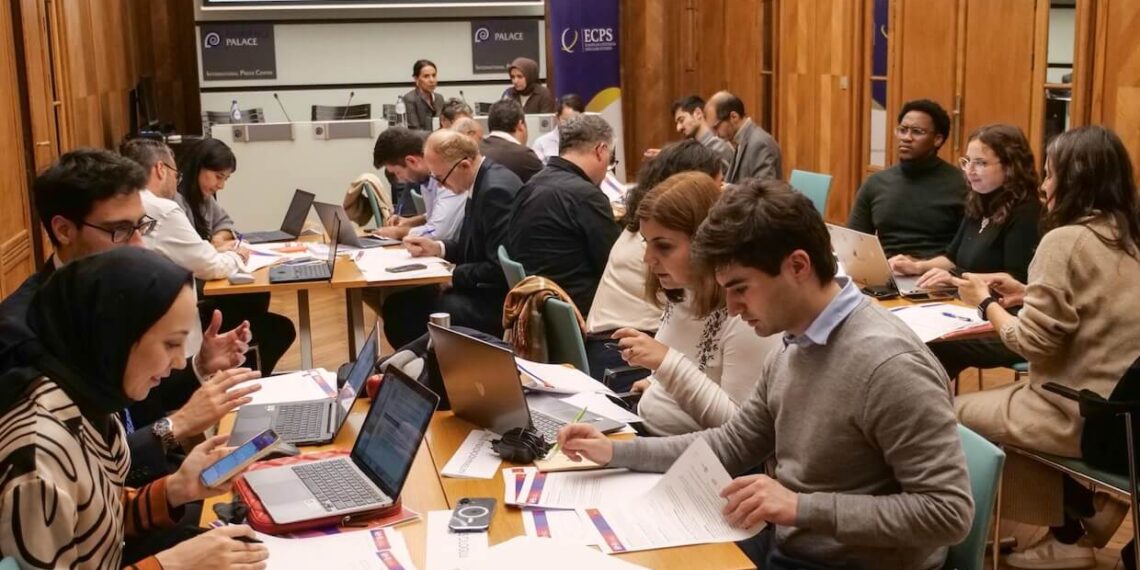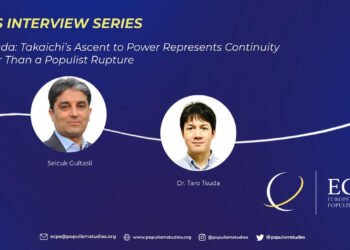On 21 October 2025, the ECPS, in partnership with Oxfam Intermón and Qalia, held the UNTOLD Europe Workshop on Migration Narratives at the Residence Palace in Brussels. Titled “The Impact of Colonial Legacies on European Migration Policies,” the event gathered scholars, journalists, and activists to examine how historical hierarchies continue to shape European migration discourses and governance. Panels led by Maria Jesús Zambrana Vega, Prof. Ilhan Kaya, and Dr. Reda Majahar, among others, explored the politics of representation, power asymmetries in knowledge production, and decolonial approaches to migration policy. The workshop concluded with group discussions emphasizing the need to decolonize migration narratives, amplify migrant voices, and promote inclusive, rights-based policy frameworks across Europe.
Program of the Workshop

Reported by ECPS Staff
On 21 October 2025, the European Center for Populism Studies (ECPS), in collaboration with Oxfam Intermón and Qalia, hosted the UNTOLD Europe Workshop on Migration Narratives at the Residence Palace in Brussels. The event, titled “The Impact of Colonial Legacies on European Migration Policies,” brought together scholars, journalists, civil society representatives, and activists to critically examine how historical hierarchies and colonial frameworks continue to influence migration discourses and policy across Europe.
The workshop opened with welcoming remarks from the project partners, followed by Maria Jesús Zambrana Vega, Project Coordinator at Oxfam Intermón, who presented the goals and structure of the UNTOLD Europe Project. She highlighted the project’s mission to uncover the enduring impact of colonial histories on European migration governance and to promote inclusive, rights-based narratives.
The introductory panel, “Who Tells the Story? Power, Perspective, and the Politics of Migration,” explored the intersection of history, power, and representation in shaping migration narratives. Professor Ilhan Kaya (Ghent University) discussed the importance of reclaiming the “right to tell” within European contexts, emphasizing memory and agency in migration storytelling. Journalist Nawab Khan reflected on the shortcomings of EU migration policy in his talk, “Why the EU Migration Policy Has Failed Till Now?”, Doctoral Researcher Marwa Neji (Ghent University) examined power asymmetries in knowledge production, while Ahsen Ayhan (Solidarity With Others) discussed the emotional and gendered dimensions of displacement in “Home We (Can’t) Carry: Migration, Gender and the Politics of Inclusion.”
The second session, “Migration Experiences – Voices and Perspectives,” foregrounded personal testimonies and lived experiences. Professor Ilias Ciloglu shared “My Personal Journey of Building a New Life in Belgium from the Ground Up,” while Becky Slack (Your Agenda) addressed the media’s role in framing migration and gender. Dr Reda Majahar (University of Antwerpen) critically examined “Global North–South Hierarchies in Refugee Research under European Funding Regimes.” Katerina Kočkovska Šetinc (Peace Institute Slovenia) and Mojca Harmandić (Pandora’s Path Institute) reflected on integration and systemic barriers in their speech “In Between Journeys and Belonging: Intersections of Migration, Integration, Support, and Systemic Barriers in Slovenia.”
After lunch, participants turned to comparative perspectives in the Country Case Studies session. Presentations explored how colonial logics inform contemporary migration frameworks: Andriana Cosciug (Romania), César Santamaría Galán (Spain), Fouzia Assouli (Morocco), and Anissa Thabet (Tunisia) each presented on their respective contexts.
The final part of the workshop was dedicated to interactive case study discussions. Participants, divided into small groups, analyzed country-specific materials and collaboratively developed alternative framings for migration narratives. They identified recurring colonial logics in European migration management, discussed missing voices, and drafted practical recommendations for EU policymakers.

The workshop concluded with group presentations and a lively plenary discussion. Participants emphasized the need to decolonize policy discourses, amplify migrant and gendered perspectives, and foster communication strategies rooted in equality and human rights.

The UNTOLD Europe Workshop offered a rich space for cross-sectoral dialogue, combining critical academic insights with creative and policy-oriented reflection. As part of the broader UNTOLD Europe Project, the event marked an important step toward reimagining how Europe narrates migration—beyond colonial legacies and toward inclusive, humane, and forward-looking policy frameworks.



